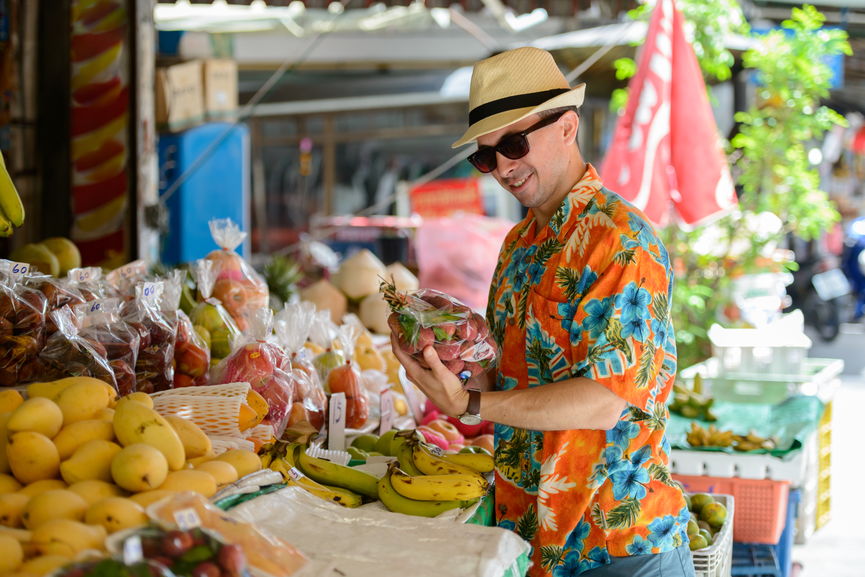Thailand is generally regarded as one of the greatest places to live in Southeast Asia in terms of affordability and quality of life. While there are other fantastic locations nearby, Thailand has earned its reputation as a beautiful destination with perfectly priced rent, food, transportation and destinations. The cost of living in Thailand per month can vary greatly from city to city, but with a little bit of an explanation, it should be quite clear that the prices are fantastic.
Cost Of Living in Thailand Per Month
On a month-to-month basis, Thailand can cost anywhere from $150 to $600 USD per month in decent conditions for rent, utilities, food and fun. Apartments and monthly hotel rentals can be as low as $80 for a room with a bed, bathroom and kitchen, but there is room to spend more for higher quality or better location. The cost of food in Thailand is right around $1 to $3 per meal, and this is a hot, cooked meal from either a local vendor or a small restaurant. Fruit and vegetable prices are extremely low, though they can rise upward when the fruit isn’t in season or other natural factors drive up the price.
For example, a pound of mango can dip down to $0.25 per pound at times, but that’s not a constant guarantee. Likewise, most other fruits and vegetables are still quite fairly priced, though there are expensive options as well. Large avocados are generally about 3 for $1, though there is a little bit of room for them to cost more or less. Deserts and other treats are also incredibly affordable and sometimes cost as little as a dime.
Expat Living in Thailand
Living in Thailand is an excellent way to meet amazing travellers from all over the world. It’s a huge, sprawling destination that’s full of people all congregating on the land for different reasons. Some travel for school, others for the price and others still are there to stay. Thailand has a huge population of expats that have learned to call the country home, and though the Thais often do not speak much English, it is still perfectly possible to get by with nothing but a few phrases, questions and sentences.
While most people flock to Bangkok or the island life, living in Chiang Mai Thailand is also advisable. The city has excellent prices and one of the biggest English-speaking populations in the country. One of the most lucrative jobs for expats is an English teaching job. For native speakers who want to become English teachers, check out these TEFL courses in Chiang Mai, Thailand. Also, Chiang Mai is initially a large retirement destination but has since been opened up to more culture, particularly global travellers and international Vegan culture.
Basics and Necessities
One of the biggest concerns that travellers have that is considering Thai life is the price of emergency care, transportation, specific products or other goods and services that fit their lifestyle. Generally speaking, if it’s being bought in Thailand, it’s going to cost less. There are exceptions, but this is the most consistent trend. For example, Thailand medical insurance can be as little as a few cents per day in some areas, and a no-appointment trip to a doctor’s office for a simple issue can often be covered with about $10. This obviously varies from place to place and depending upon conditions, but Thai medical insurance and health care are usually phenomenal for the price, especially when compared to the United States.
Other basics such as shampoo, conditioner, toothpaste, toilet paper and common household items are as cheap as they come. There are grocery stores and larger markets that sell these at markups, but even then, the prices are still almost universally lower than they would be in a western country. More importantly, if it’s a household staple, there is bound to be a huge variety of options within walking distance unless the location is rural or low population. This is comparable to the cost of food in Thailand: Though there may be a dozen food carts nearby, a grocery store that’s a mile away might charge more for lower quality food. The cost of food in Thailand parallels other goods in that while there is no guarantee that the prices will be great, the prices are almost universally fantastic.
Travel, Arrival and Travel
Getting to Thailand is exceptionally affordable at certain airports and with a bit of research on different flight companies and services. The Visa process can be a little bit complicated, but tourist visas are easy to obtain. The easiest way to have a year of access is with a volunteer visa, but work and study visas are also available to those that seek that route. The common tourist can be reissued five times for a grand total of 150 days in Thailand, but that involves crossing and recrossing the border every 30 days.
After arrival, planes, trains, buses, tuk-tuks and taxis are all extremely abundant and affordable. Getting from one side of the country to the other generally costs between $30 and $60 on a plane and $5 to $10 by train, though different companies can charge more or less. Tuk-tuks are only recommended for short distances, and even then, tuk-tuks are not really all that recommended. Taxis are a great option, but be sure to insist that they use the meters. The buses are quite cheap as well, but there’s more variety in prices depending upon the distance travelled.
And that’s about all it takes to understand expat living in Thailand. The cost of living in Thailand is clearly fantastic, and it’s a highly recommended global destination for a reason. It’s beautiful, fun and affordable, and it looks to stay that way for a very long time. It’s called the “land of smiles” by the people.

